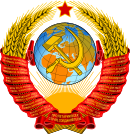Sixtiers
| Part of a series on the |
| Culture of the Soviet Union |
|---|
 |
| People |
| Languages |
| Traditions |
| Cuisine |
| Festivals |
| Literature |
| Sport |
|
This article may be expanded with text translated from the corresponding article in Ukrainian. (June 2012) Click [show] for important translation instructions.
|
The Sixtiers (Russian: Шестидесятники, Ukrainian: Шістдесятники) were representatives of а new generation of the Soviet Intelligentsia, most of whom were born between 1925 and 1945, and entered the culture and politics of the USSR during the late 1950s and 1960s — after the Khrushchev Thaw. Their worldviews were formed by years of Stalin's repressions and purges, which affected many of the Sixtiers' immediate families; and World War II, where many of them had volunteered to fight.
Sixtiers were distinguished by their liberal and anti-totalitarian views, and romanticism that found vivid expressions in music and visual arts. Although most of the Sixtiers believed in Communist ideals, they had come to be strongly disappointed with Stalin's regime and its repression of basic civil liberties.
Many of the Sixtiers were intellectuals of roughly two strains: the "physicists" (those involved in the technical sciences) and the "lyricists" (writers, theater and film professionals, and otherwise liberal arts representatives). Bard (singer-songwriter) culture, poetry, disillusionment in politics, and love for camping trips to the farther regions of the Soviet Union were some of the common attributes and pastimes of the Sixtiers.
After the beginning of the "Perestroika" and "Glasnost" policies, (late 1980s - early 1990s), the term "Sixtiers" was also used to denote the representatives of the new generation of communist elites whos political views were formed in the late 1950s — early 1960s. These include politicians M. Gorbachev, O. Yakovlev, philosophers A. Zinoviev, M. Mamardashvili, Y. Levada, political scientists A. Bovin, F. Burlatsky, mass media editors - V. Korotych, E. Yakovlev, S. Zalygin and many others.
The Sixtiers had some parallels to the New Left and hippie movements in the West but had more in common with the more intellectual-oriented Beat Generation.
Ukrainian Sixtiers[]
The Sixties defended the national language and culture, freedom of artistic creativity.
The most famous members of the movement were writers Ivan Drach, Valeriy Shevchuk, Mykola Vingranovsky, V. Drozd, Hr. Tyutyunnyk, B. Oliynyk, V. Donchyk, Vasyl Symonenko, Mykola Kholodny, Lina Kostenko, V. Shevchuk, E. Hutsalo, painting artists Alla Horska, Viktor Zaretsky, Borys Chichibabin, literary critics Ivan Dziuba, Yevhen Sverstyuk, director Les Tanyuk, film directors Sergei Parajanov, Yuriy Ilyenko, art critics Roman Korogodsky, Y. Smyrny, translators Hryhoriy Kochur, Mykola Lukash and others.
The Sixtiers opposed official dogmatism, professed freedom of creative expression, cultural pluralism, and the priority of universal values over class ones. They were largely influenced by the Western humanistic culture, the traditions of the "Executed Renaissance" and the Ukrainian culture of the late XIX - early XX centuries.
The unofficial cultural activities of the Sixties included informal literary readings and art exhibitions, evenings in memory of repressed artists, and silences staged plays. They also composed petitions in defense of Ukrainian culture. The Club of Creative Youth "Contemporary" (created in 1959-60) in Kyiv, and the club "Snowdrop" (1962) in Lviv became centers of alternative national culture. The Sixtiers restored the traditions of the classical pre-revolutionary intelligentsia, which aspired to spiritual independence, political alienation, the ideals of civil society and service to the people.
Such cultural activities caused dissatisfaction of the authorities. The Sixtiers failed to keep within the official ideological and aesthetic boundaries, and in the end of 1962 began massive pressure on the nonconformist intelligentsia. The Sixtiers were not allowed to be published, and were accused in "formalism," "inaction," and "bourgeois nationalism". In response, the ideas of the Sixties began to spread in samizdat.
Faced with fierce resistance from the party apparatus, some of the Sixties compromised with the authorities, while others evolved into political dissidents, members of the human rights movement, and open opposition to the regime.
See also[]
Further reading[]
- Zubok, Vladislav (2009). Zhivago's Children: The Last Russian Intelligentsia. Belknap Press of Harvard University Press. ISBN 978-0-674-03344-3.
References[]
- Cultural generations
- Demographics of the Soviet Union
- 1950s in the Soviet Union
- 1960s in the Soviet Union
- Soviet society
- Soviet culture